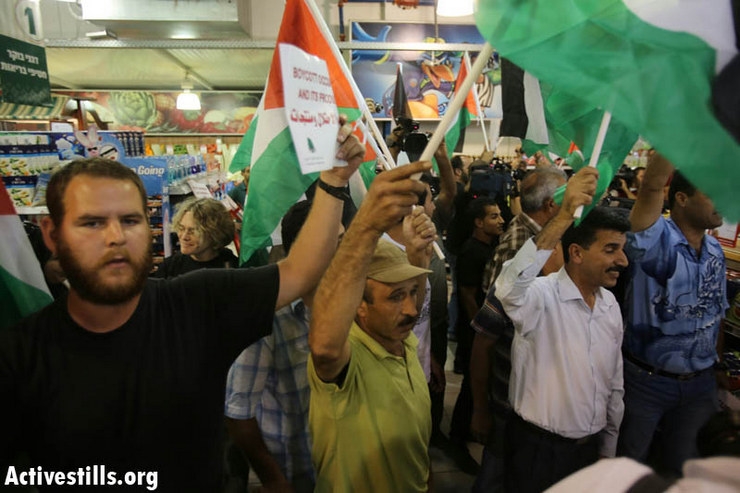The Israeli government sees the idea of a settlement boycott as a farce because it knows how impossible it would be to stop even a targeted boycott from bleeding right through the Green Line it’s been working so hard to erase.

A year after the European Union published guidelines for labeling Israeli settlement products, France last week published its own regulations obligating importers and retailers to label all settlement goods — not just noting that a product comes from the West Bank but that it comes from an Israeli settlement in the West Bank.
Israel’s seemingly disproportionate objections to the European labeling regime is difficult to understand for many, especially considering that the EU has for decades differentiated between Israel and its settlements in the occupied territories. The EU free trade agreement with Israel, for instance, does not apply to Israeli settlements, and every other treaty and agreement makes the same distinction.
In France, Israel’s objections are even more confounding considering that actual boycotts of Israel are against the law in that country. So why is Israel making such a big deal out of the settlement product labels?
The brouhaha isn’t actually about labels. It’s about the next logical step of a labeling regime or even a boycott of settlement products: boycotting, divesting and sanctioning entities that do business in or with the settlements.
That deeply worries Israeli decision makers because in reality there is no differentiation between the economy of Israel and the settlement economy. On the ground, in the financial system, and in countless other ways, there is no Green Line as far as the Israeli economy is concerned.
The same Israeli banks that give homeowners and real estate developers mortgages and loans in Tel Aviv also finance the development and purchase of homes in West Bank settlements. The same cellular companies that provide service in Haifa build cellular towers in illegal settlement outposts in the West Bank. The same supermarkets and pharmacies and gas stations that serve Be’er Sheva also have branches in settlements throughout the West Bank. And the same police department that patrols the streets of Caesarea also enforces segregation on the streets of Hebron.

Boycotting a farmer from Tekoa, a winery in Psagot, or a factory in Mishor Adomim might make the decision to locate a business beyond the Green Line less profitable, and perhaps even spur a decision to move shop. If global financial institutions were to cut ties with the Israeli banks that finance construction in those same settlements, however, the effect on the Israeli economy could be far more devastating.
If cellular companies were unable to sign roaming agreements overseas, petrol companies unable to buy gasoline, retailers unable to import goods — then a settlement boycott might start to make the settlement enterprise a liability for all of Israel, on both sides of the Green Line.
That is not happening, though. Even with the European guidelines and labeling regimes and differentiation mechanisms, the settlement enterprise is still more of an asset than a liability. As Noam Sheizaf explained here, in many ways the occupation is actually a source of income and profit for Israel.
Israeli companies extract natural resources like stone, gravel and water from the West Bank. Instead of having to purchase land, military seizure orders are used to increase the housing supply and build segregated highways, creating subsidized commuter suburbs for Jerusalem and Tel Aviv. And the occupied Palestinian population becomes a virtual captive market for Israeli products.

Israel is worried about a settlement boycott because not only is the settlement economy virtually inseparable from the Israeli economy, the occupation is part of the Israeli economy. Blurring whatever remains — or once existed — of the line distinguishing the two has been one of the Netanyahu government’s greatest projects.
As I noted earlier this month, a government interested in eventually withdrawing from the West Bank to allow the creation of a Palestinian state would not speak openly about annexing major settlements or the majority of the Palestinian territories; it wouldn’t be announcing plans to lay rail lines connecting settlements to Jerusalem. A prime minister interested in withdrawing from the West Bank wouldn’t say he is the best friend the settlements will ever have.
The truth is that Israel’s settlements are not only an inextricable part of the Israeli economy, they have become an inextricable part of Israel, at least as far as the current leadership sees things. Israeli leaders see the idea of a limited boycott of the settlements alone as a farce because they know it would bleed right through the Green Line they’ve been working so hard to erase.

